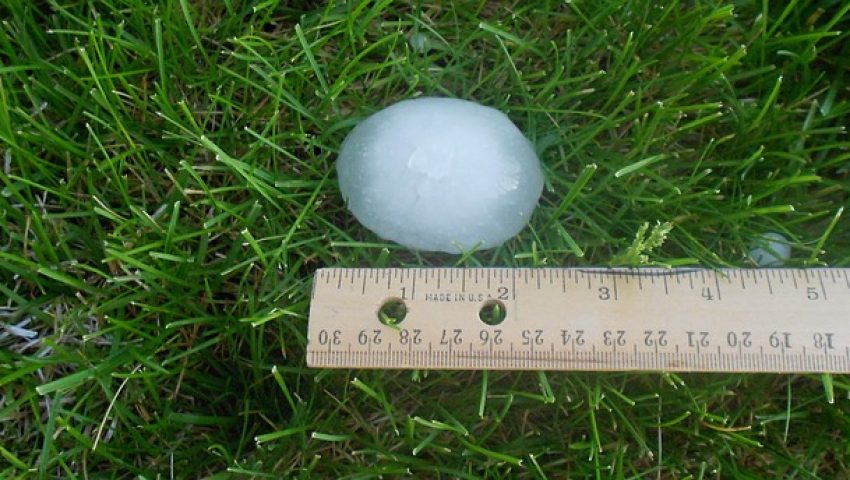Roof hail damage can happen after any hail storm, no matter what size of hail falls from the sky. Even pea-sized hail can cause hail damage on roofs. The most common roof hail damage from pea-sized hail is dents and dings, which can affect the value of the home and the integrity of the roof. If the hailstorm throws down golf ball size or tennis ball size hail, the force of impact can shatter skylights, rip off gutters, shred the exterior paint and break through shingles.
Colorado has frequent hail storms in the spring, and when the hail hits, you need to take action. Here are the steps to follow after a hailstorm.
Hail Damage Roof Inspection
The first thing to do after a hailstorm is get a hail damage roof inspection from a qualified Denver roofing contractor. The advantage of a roof inspection is to find out what kind of roof hail damage has occurred before you call your insurance company. A hail damage roof inspection is free, so there is no risk or obligation to have a roof inspection for hail damage. Contractors who do roofing in Denver will work with your insurance company and help you through the claims process.
Roof hail damage is not always immediately noticeable. The impact of hail can cause underlying deterioration that over time results in premature aging of the shingles. Latent damage that is caused by hail may not be visible for months or even years later. Typical hail damage to roofs will be seen as indentations and fractures on the surface of the shingle. Because hailstones vary in size, shape and density, they can create a random pattern of dents and depressions. At the point of impact, clusters of granules can come off in a random pattern which exposes the asphalt. Most homeowners don’t have the visual acuity to determine true hail damage on roofs, and this is why a hail damage roof inspection is imperative.
Insurance
The next step is to contact your homeowner’s insurance provider. Your insurance agent will let you know what type of coverage you have for hail damage to roofs. Before you file a claim, take pictures of the roof hail damage and any other damage to your property. It’s also a good idea to document the time and date of the hail storm and make a note about the size of the hail. After talking with your insurance agent, a claim will be filed and a date is set for an insurance adjuster to come to view the roof hail damage.
Claims Adjuster

Once the roof hail damage claim is processed, the insurance company will send out a claims adjuster who evaluates the hail damage on roof. The claims adjuster creates a report about the roof hail damage and sends it back to the insurance company. The insurance company will calculate how much they will pay for a roof repair. When the claims adjuster comes to your home, it is recommended that you also have a qualified Denver roofing inspector present as well.
Claim Payment
The last step is the insurance payment. After the adjuster has submitted the roof hail damage evaluation, the insurance company will mail a check for roof hail damage repair, less your deductible. Once you receive the payment, you can schedule the hail damage roof repairs with a Denver roofing contractor.
Warranty
A qualified Denver roofing contractor will provide a warranty after the work is completed. You will receive a document that shows the workmanship warranty on all repairs and replacements that were completed.
Buyer Beware
There are many unqualified roofing companies who knock on your door after a hailstorm and offer a free roof inspection. Beware of these solicitations. A good standard to judge a Denver roofing company is they should have been in business for as long as the warranty they offer. Ask for references and check with the Better Business Bureau. Do a search for the Denver roofing contractor’s physical business address and phone number. Call and confirm they are fully licensed and insured. These steps are important before you allow a hail damage roof inspection on your home, and especially important before you sign a contract. Your best bet is to ask your insurance provider for a list of Denver roofers who have been vetted and approved by your insurance carrier.
Final Tip
One final tip is to make sure you have roof hail damage coverage on your homeowner’s insurance policy. This is highly recommended because Colorado has many hail storms every year. Without proper insurance coverage, the repair cost for hail damage to roof can be very high.
At Peak to Peak Roofing, we help you through the entire insurance claims process. We handle communications with your insurance carrier to make sure your scope of loss is an accurate reflection of the work to be done, and that all pricing is based on fair market value.
Peak to Peak Roofing also provides emergency repair services for roof hail damage. We are a full-service insurance restoration firm, and we offer free hail damage roof inspections. Call us today to schedule a hail damage roof inspection and ask about our emergency repair services.


